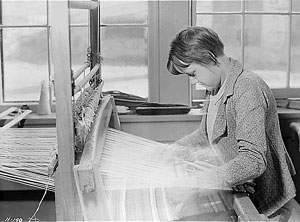
Arrowmont School of Arts and Crafts
Arrowmont, a visual arts complex in Gatlinburg in Sevier County, grew out of the manual arts curriculum of the Pi Beta Phi Settlement School. The Pi Phi teachers taught handicraft skills to the community while seeking to revive traditional crafts among these mountain people. With an active weaving, furniture, and basketry program, the women’s fraternity marketed the crafts to its national membership to supplement and stimulate the local economy. In 1926 the Pi Phis started the “Arrow Craft” Shop (later Arrowcraft) to market the products to a growing tourism industry. Although materials, instructions, and ideas came from outside of Appalachia, local residents interpreted the crafted items in their own way and returned the finished products to the shop for sale. In 1940, in reaction to the opening of the Great Smoky Mountains National Park, the fraternity built a new Arrowcraft building to house the work of over ninety artisans. In the mid-1940s, Pi Phi chose to enhance its offerings by establishing a summer program.
The fraternity approached the Department of Crafts and Interior Design of the College of Home Economics at the University of Tennessee about using the Gatlinburg premises during the summer to expand the influence of both entities in the crafts field. In 1945 this cooperative effort produced its first summer craft workshop. Under the leadership of Marian G. Heard, the summer workshop blossomed. While the Arrowcraft Shop continued to market crafts from local artisans, the summer workshops attracted students and instructors from around the world. The quality instruction and the pastoral surroundings created an atmosphere in which artists and craft workers could concentrate on developing their skills. The university also offered college credit through the Pi Beta Phi workshops.
The availability of locally made craft items attracted tourists, while an available market brought more crafts workers to town. In 1948 the Southern Highlands Handicraft Guild sponsored its first Craftsman’s Fair at the Pi Beta Phi School, exhibiting local craft work and helping to establish Gatlinburg as a thriving craft center. At the 1964 Pi Beta Phi Convention, the fraternity decided to establish an arts and crafts school as a part of its centennial celebration.
The rapid modernization of the area around Gatlinburg changed the fraternity’s mission from a three-way focus on academics, health care, and manual instruction to a single emphasis on the arts and craft work. In 1965 the fraternity closed its medical clinic. The same year Sevier County assumed control of the school facilities, leaving only the arts and crafts curriculum. The fraternity focused its energy on building a reputable arts and crafts school. In 1969 they changed the name of the school, and within a year the Arrowmont School of Arts and Crafts had been formally established and ensconced in its new thirty-eight-thousand-square-foot facility. It contains galleries, workshops, and libraries, while dormitories house students, instructors, and artists-in-residence. Marian Heard retired as director in 1977. Two years later, Sandra J. Blain, a University of Tennessee professor and nationally known potter, became director.
In 1994 the Southern Highlands Handicraft Guild assumed operation of the Arrowcraft Shop to market products from all over the southern Appalachian region, leaving Arrowmont to focus on instruction rather than marketing. Emphasizing art as a part of everyday experience and expression, the school offers seminars, conferences, community classes, and an Elderhostel program featuring internationally known instructors. Although hand-woven products have not been in high demand in recent years, Arrowmont continues to lead in the arts and crafts field through its diverse program and eclectic outlook.



